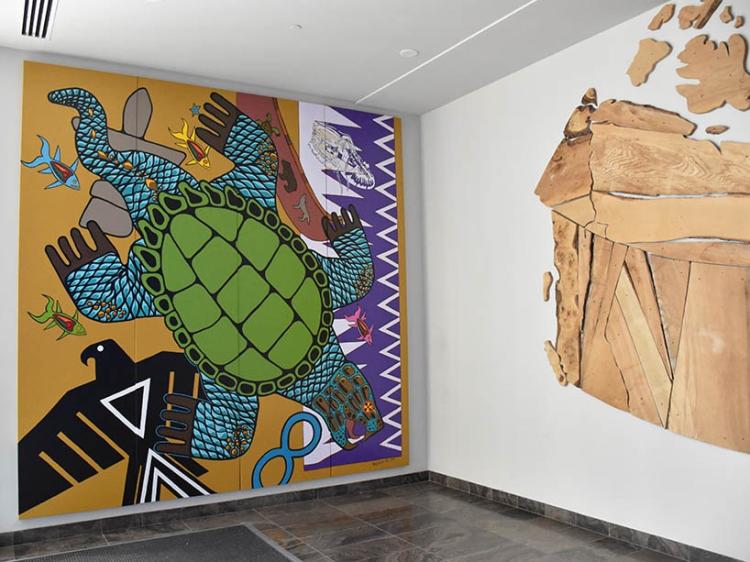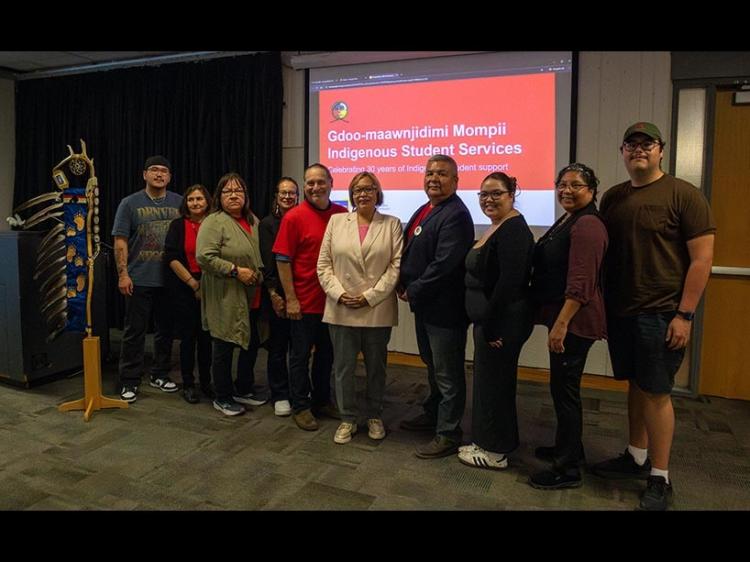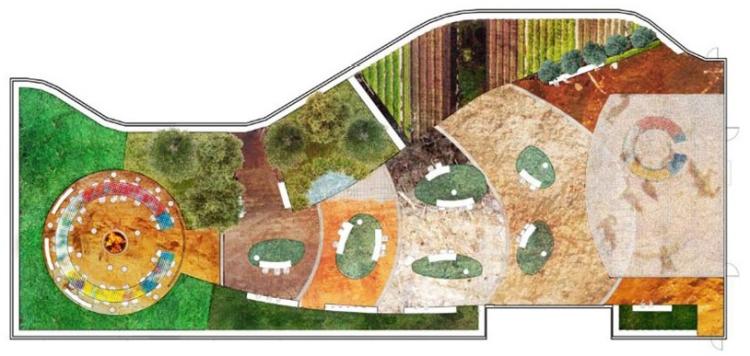The pursuit of truth and reconciliation at Toronto Metropolitan University (TMU) is not just an institutional goal; it is a shared journey that benefits from the contributions of every individual within our community.
A community of voices began this journey in 2015 when aspirations were shared in talking circles, consultation meetings, events and course projects, culminating in the release of The Truth and Reconciliation (TRC) Community Consultation Summary Report in 2018.

Indigenous History of the Land, a mural painted by Philip Cote, featured on the landing of the seventh floor of the Ted Rogers School of Management building. Photo by: Habibah Haque.
Aiming to address the systemic barriers within our community, this report laid the groundwork for meaningful change at TMU. It directly led to the establishment of the Truth and Reconciliation (TRC) Strategic Working Group shortly after its release in early 2018. The membership spans different faculties and departments from across the university, bringing together a variety of contexts and viewpoints.
Truth and Reconciliation Strategic Working Group
In the years since, the TRC Strategic Working Group has worked towards implementing the 50 recommendations in the TRC Community Consultation Summary Report, collaborating with Indigenous and non-Indigenous members from across the university to ensure that diverse perspectives shape the ongoing work.
This collaborative approach allows the group to serve as a space for ongoing consultation for initiatives and priorities that honour the intent of the report's recommendations. The process also responds to the community's evolving needs, commitments and parallel initiatives, including implementing the Standing Strong (Mash Koh Wee Kah Pooh Win) Task Force recommendations.
The group exemplifies a community of voices dedicated to creating a more inclusive environment where every member can contribute to the shared journey of reconciliation. By engaging in meaningful dialogue and collaborative initiatives, they strive to ensure that the aspirations of both Indigenous and non-Indigenous members of the TMU community are heard and integrated into the university's ongoing transformation.
This collective effort reinforces the idea that reconciliation is not a destination but a continuous process shaped by the contributions and experiences of all community members.
Honouring Murray Sinclair's legacy
Murray Sinclair, former judge, senator, chancellor and chair of Canada's Truth and Reconciliation Commission, who passed away in November, emphasized that truth and reconciliation is a shared responsibility that extends far beyond personal connections to the country's history. His words are central to our work at TMU: "I don't care if you feel responsible for the past. The real question is, do you feel a sense of responsibility for the future? That's what this is all about."
Sinclair's message challenges us to focus on the past and our role in creating a future built on understanding, healing and collective action. At TMU, we honour his legacy by committing to the ongoing work of reconciliation, understanding that it is a journey that belongs to all of us.
Update on progress
In the past year, efforts that have received guidance and feedback from the working group include, but are not limited to, the following:
Enhancing Indigenous education and honouring Indigenous histories
Education on Land Acknowledgements
The university introduced resources to assist community members in creating personalized land acknowledgements. Led and approved by the Indigenous Education Council, these guidelines emphasize authenticity and reflection, encouraging individuals to connect deeply with the land's history and Indigenous Peoples' rights.
Read more about the launch of these new resources.
Advancing Indigenous Education
Building on the TRC Community Consultation Summary Report, the Standing Strong Task Force report recommended mandatory learning opportunities about Indigenous history and Indigenous and colonial relations for all students. Drawing from community-wide consultation, a systemic implementation approach was developed that is responsive to disciplinary and professional expectations and supports students' capacities in their chosen professions and communities. TMU's Periodic Program Review Process now includes attention to a program's progress and planning related to this recommendation.
Indigenous faculty growth
A key driver of embedding Indigenous education and diverse ways of knowing at TMU involves increasing Indigenous faculty representation. As of October 2024, TMU has 25 tenure-track Indigenous faculty members, up from seven in the 2018-19 academic year. This growth supports the academic environment and promotes the inclusion of Indigenous perspectives in teaching and scholarship.
Advancing Indigenous student support and experiences
Across TMU, student-facing teams, including Gdoo-maawnjidimi Mompii Indigenous Student Services, Indigenous Initiatives in the Office of the Vice-President, Equity and Community Inclusion (OVPECI) and the Office of the Vice-Provost, Students, have collaborated to provide culturally responsive and holistic support to Indigenous students.
Celebrating 30 years of Gdoo-maawnjidimi Mompii Indigenous Student Services
The Gdoo-maawnjidimi Mompii / We Gather Here Indigenous Student Services (GMISS) celebrated 30 years of empowering Indigenous students at TMU in the fall of 2024.
Founded by Monica McKay, director of Indigenous Initiatives, OVPECI, GMISS brings together essential support services, programs and the Indigenous Student Centre under one roof, supporting Indigenous students so that they feel recognized and valued.
The anniversary celebration honoured the department's contribution to amplifying Indigenous voices. It acknowledged the work ahead, underscoring the importance of community and collaboration in the collective journey toward reconciliation and decolonization. Read more about the 30th anniversary celebration.

The Gdoo-maawnjidimi Mompii Indigenous Student Services (GMISS) team assembled for a group photograph to celebrate their work. From left: Sam Dyer, Diane Simone, Sheila Saikkonen, Sloan Miller, Bradley Gibson, Monica McKay, Brian Norton, Christa McKay-Kosolofski, Amy Desjarlais and Taye Alvis. Photos by Carrie Davis.
Collaborations with GMISS
An example of one such collaborative effort is the Indigenous Career Mentorship Program, launched in 2021 and saw its largest cohort yet in 2024. Ten mentor-mentee pairs) were supported by Indigenous Career Mentorship Program Facilitator and TMU alumna Delia Sheppard. This is almost twice the average annual number of mentor-mentee pairs.
A partnership between GMISS and Career, Co-op & Student Success, with support from the Tri-Mentoring Program, the program exemplifies TMU's dedication to supporting Indigenous students in their professional journeys, matching Indigenous students with Indigenous professionals for mentorship.
Also, in coordination with GMISS, Housing & Residence Life reserves ten beds in residence for first-year Indigenous students, aiming to enhance their transition to university life. In response to student feedback, the arrangement has shifted from single rooms to shared living spaces starting in 2024-25, intending to foster community among residents.
Embedding Indigenous culture and visibility into community spaces
New Placemaking addition
Extending outward from TMU's efforts to create an inclusive environment through knowledge, resource, and service spaces, TMU's Placemaking initiative brings Indigenous representation into the physical community space.
The most recent addition to this initiative was the unveiling of the Ted Rogers School of Management's (TRSM) artwork, titled Indigenous History of the Land, painted by Philip Cote. The mural was presented in November 2024 during Treaties Recognition and Indigenous Education Week at TMU. During the artist talk, Cote shared his knowledge about the ancestral history of the Mississaugas of the Credit First Nation, the Ojibwe, the Haudenosaunee, and the Huron Wendat peoples presently living on Treaty 13 territory with the Mississaugas of the Credit First Nation.
The mural aims to foster a sense of belonging within the Indigenous community and enhance collective understanding of treaty recognition, grounding everyone meaningfully as they live, work, and gather on our campus.
The addition came as part of TRSM's aim to respond to Canada's Truth and Reconciliation Commission's (TRC) Call to Action #92 by committing to meaningful partnerships with Indigenous communities to promote economic empowerment and wellbeing.
Indigenous Healing Garden
Also, as part of this commitment, TRSM has planned a project that aims to transform the Ted Rogers School courtyard into an Indigenous healing garden and learning space with plant medicines known to improve physical, mental, emotional and spiritual health and decrease anxiety.

Rendering of the Indigenous Healing Garden by the Indigenous Design Team.
New Indigenous TMU website
Launched in the spring of 2024, the new Indigenous TMU website serves as an online hub for Indigenous-related resources, events, programs and initiatives at Toronto Metropolitan University.
The user-friendly site provides a holistic view of the university's journey towards decolonization, facilitating access to information and resources that support collaboration between departments, students and the broader community, as the 2018 TRC Community Consultation Summary Report calls for.
The TMU community is encouraged to explore the site, engage with its resources, and participate in essential conversations surrounding Indigenous issues and initiatives. Involvement is vital to fostering a more inclusive and informed campus community.
Have an initiative to share?
As we continue this shared journey toward truth and reconciliation, we celebrate the incredible work being done across our university. Every initiative, project, and resource contributes to our commitment to supporting Indigenous students, faculty, staff, and the broader community. If you are involved in the recruitment, retention and success of Indigenous students, faculty and staff, curriculum development, training programs, or other initiatives, we encourage you to share your work with us.
To share your initiative or get involved with the TRC Strategic Working Group, contact Rose Sandino at rose.sandino@torontomu.ca.
We can strengthen our path toward a more inclusive and equitable future.










